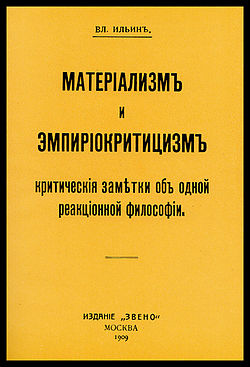
Back المادية والمذهب النقدي التجريبي Arabic Materializm və Empirio-tənqid Azerbaijani বস্তুবাদ ও অভিজ্ঞতাবাদী সমালোচনা Bengali/Bangla Materialismus und Empiriokritizismus German Materialismo y empiriocriticismo Spanish ماتریالیسم و امپریوکریتیسیسم Persian Matérialisme et empiriocriticisme French Մատերիալիզմ և էմպիրիոկրիտիցիզմ Armenian Materialisme dan Empirio-kritisisme ID Materialismo ed empiriocriticismo Italian

Materialism and Empirio-criticism (Russian: Материализм и эмпириокритицизм, Materializm i empiriokrititsizm) is a philosophical work by Vladimir Lenin, published in 1909. It was an obligatory subject of study in all institutions of higher education in the Soviet Union,[1] as a seminal work of dialectical materialism, a part of the curriculum called "Marxist–Leninist Philosophy".[2] Lenin argued that human minds are capable of forming representations of the world that portray the world as it is. Thus, Lenin argues, our beliefs about the world can be objectively true; a belief is true when it accurately reflects the facts. According to Lenin, absolute truth is possible, but our theories are often only relatively true. Scientific theories can therefore constitute knowledge of the world.[2]
Lenin formulates the fundamental philosophical contradiction between idealism and materialism as follows: "Materialism is the recognition of 'objects in themselves' or objects outside the mind; the ideas and sensations are copies or images of these objects. The opposite doctrine (idealism) says: the objects do not exist, outside the mind '; they are 'connections of sensations'."[3]
- ^ Rockmore, Tom; Levine, Norman, eds. (2018). "Lenin and Stalin: Theory and Politics". The Palgrave Handbook of Leninist Political Philosophy. Springer. ISBN 9781137516503.
- ^ a b Bakhurst, David (2018). "On Lenin's Materialism and Empiriocriticism" (PDF). Studies in East European Thought. 70 (2–3, 28 June 2018): 107–119. doi:10.1007/s11212-018-9303-7. S2CID 149668554.
- ^ W. I. Lenin: Materialism and Empirio-criticism. Critical Remarks about a Reactionary Philosophy. Publisher for Foreign Language Literature, Moscow 1947. p. 14.
© MMXXIII Rich X Search. We shall prevail. All rights reserved. Rich X Search